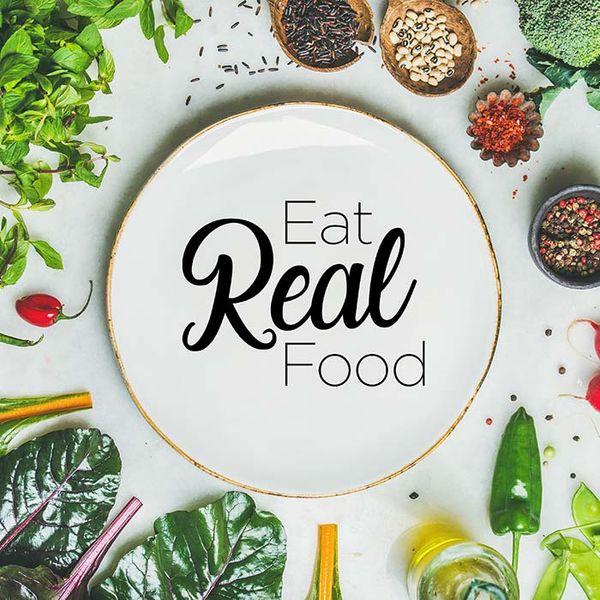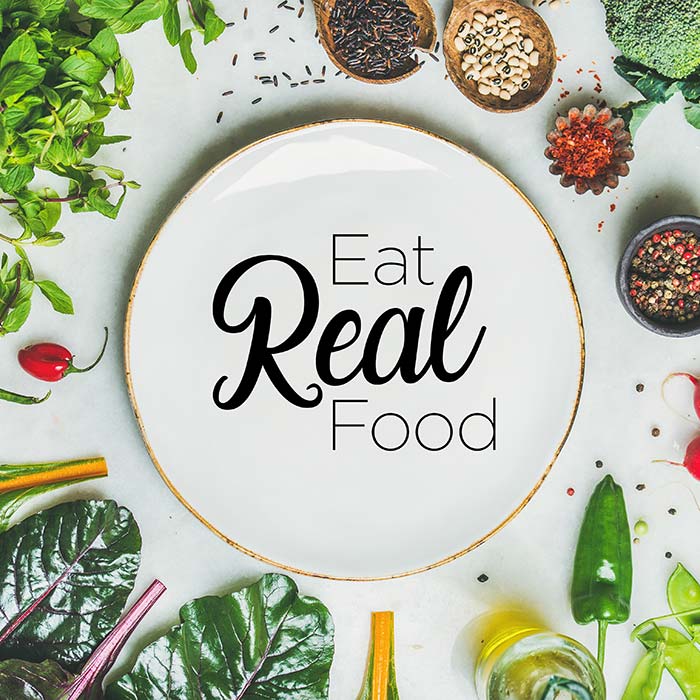Consistent overeating can lead to an unhealthy weight. Nearly 70% of adults in the United States are overweight or obese.
Yet, when it comes to meal time, this is what so many of us end up doing.
The question is, what can we do to stop overeating?
In this post, overeating can refer to eating too much in one sitting or eating too many calories overall.
I asked our Facebook Fans for their best tips to stop overeating and used their answers as the basis of this list below. I tried to prove as many of these techniques as possible by linking to a scientific study or related resource when possible, but for the others, we will accept the anecdotal proof that they worked for some of our customers and fans.
I know there are a lot of people out there who are against counting calories. Instead telling you to eat as much as you want of "real food." That advice works for some, but you can actually overeat healthy foods as well.
This post is aimed at helping the average person find a few ways to stop overeating and maintain a healthy weight.
There is some overlap between the items on the list as some many of the items have similar reason for working (eg. causing you to slow down while eating).
Hopefully you can find a few techniques on this list that work for you.
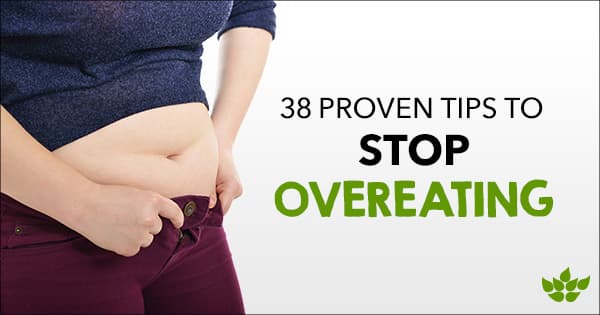
1Track Your Food
Tracking the food you eat is the first step to stop overeating. Use a food journal as a starter approach to monitor your eating habits or use a website/app like MyFitnessPal for a more accurate system.
Plan your daily caloric limits to help you lose weight, maintain your weight or do a healthy bulk—then don't go outside the plan.
2Use a Food Scale
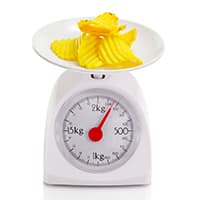 This is probably the single most important item on the list. You have no idea how much you are actually eating unless you are weighing your food. Most people significantly underestimate the actual number of calories they consume. Don't trust measurement guidelines and estimations, you are likely guilty of underestimating what you are eating.
This is probably the single most important item on the list. You have no idea how much you are actually eating unless you are weighing your food. Most people significantly underestimate the actual number of calories they consume. Don't trust measurement guidelines and estimations, you are likely guilty of underestimating what you are eating.
If you are trying to lose weight and you are not losing weight, you are likely still overeating. Weigh all of the food you eat to make sure you know exactly how much you are consuming.
3Don't Eat at Night
According to Examine.com, there isn't any proof that eating at night leads to an increase in fat gain. I would still recommend setting a cut-off time for your eating habits. A late night snack is usually an impulse craving and will be calories that you did not plan or budget for, resulting in overeating for the day.
4Add Protein
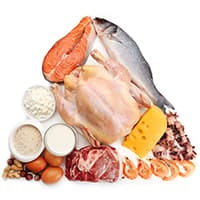 A study in the American Journal of Clinical Nutrition shows that increased protein levels can help with increasing satiety, increasing thermogenesis as well as the maintenance or accretion of fat-free mass. Meaning you will feel more full, burn more fat and maintain or build muscle. Sounds pretty good right?
A study in the American Journal of Clinical Nutrition shows that increased protein levels can help with increasing satiety, increasing thermogenesis as well as the maintenance or accretion of fat-free mass. Meaning you will feel more full, burn more fat and maintain or build muscle. Sounds pretty good right?
Aim to have some protein with every meal or snack. Even better, make protein a significant portion of your daily macronutrient count (or "macros"), i.e., the number of grams of protein, carbohydrates, and fats you consume on a given day.
5Avoid Artificial Sweeteners
Despite having zero calories, there have been studies that show artificial sweeteners in diet soda actually trick us into overeating by confusing the brain. It's best to avoid these alltogether.
6Eat Breakfast
 A study found that people who ate breakfast were less likely to overeat later in the day. Of course, other studies have shown that eating or skipping breakfast has little impact on weight.
A study found that people who ate breakfast were less likely to overeat later in the day. Of course, other studies have shown that eating or skipping breakfast has little impact on weight.
Try to figure out what works for you. I prefer eating a breakfast that is high in protein and with some healthy fat. Eggs are a favorite.
7Learn To Be Hungry
There are plenty of people all over the world who live significant portions of their day with a feeling of hunger. Learn to accept (within reason, or course) that as a normal feeling. Check out the "Learn to appreciate mild hunger" section of Mr. Money Mustache's post on How to Be Slim and also take a glance at the The Magic of Hunger article on US News, specifically the part about "The Hunger Scale."
8Eat Real Food
Have you ever noticed how much food you can eat at a Fast Food Restaurant and you still feel hungry a couple of hours later? I sometimes eat 3 burgers at McDonalds, which is something I would never do at home. When you eat real, whole foods you will be getting a more nutrient rich, fiber packed meal that will help you achieve a feeling of satiety much earlier.
A study by David Katz of Yale University concluded that "a diet of minimally processed foods close to nature, predominantly plants" is indeed the best way to go.
9Try Intermittent Fasting (IF)
Intermittent fasting can be done by intentionally skipping meals, with some people choosing to go a full 24 hours without food. A study linking intermittent fasting and weight loss showed that after a few weeks hunger was low on IF days and remained low. A caveat: Some studies have indicated that IF can be dangerous for women by disrupting hormone levels.
10Don't Eat in Front of the TV
 Being distracted when you eat can lead you to eat more than you intend to. You might simply snack until an episode is over or simply not realize you are full when focusing on a show instead of your body. A study showed that attentive eating is a simple but effective approach for weight loss and maintenance.
Being distracted when you eat can lead you to eat more than you intend to. You might simply snack until an episode is over or simply not realize you are full when focusing on a show instead of your body. A study showed that attentive eating is a simple but effective approach for weight loss and maintenance.
11Turn Off the TV
There is a lot of food tempting you when you watch TV. Watching an episode of Diners, Drive-Ins and Dives always leaves me craving a greasy, unhealthy snack. Even if I recently ate. This study by Cornell University proved that watching food related TV leads to an increased caloric intake.
12Eat 1/2 Portions at Restaurants
A study by JAMA showed that the average restaurant meal contained 1,128 calories. With many people trying to eat 1,500-2,000 calories per day, you can see how this tempting, large plate of food can cause you to overeat.
Try ordering from the lunch menu or requesting a half portion of the dish to cut down. Also, avoid the bread basket while you wait for your food.
13Be Mindful When Eating Healthy Foods
When presented with a standard version and a healthier version of the same food, study participants ate larger portions of the healthy version. Just because something is healthier in some way, it doesn't mean you can eat twice as much of it.
14Moderate Alcohol Consumption
 Studies show that people eat more after alcohol consumption compared to those who are not consuming alcohol. I'm not sure if a study was actually needed on this one, as I think most of us have gone to Taco Bell or ordered a pizza after having a few adult beverages.
Studies show that people eat more after alcohol consumption compared to those who are not consuming alcohol. I'm not sure if a study was actually needed on this one, as I think most of us have gone to Taco Bell or ordered a pizza after having a few adult beverages.
If you wake up with a hangover, you are more likely to spend the day turning to convenient processed foods as opposed to doing the work needed to prep and enjoy a healthy meal.
Last but not least, we shouldn't forget that alcohol itself is high in calories.
15Meditate
A lot of people use food for comfort. There have been initial studies that suggest using mindfulness meditation may help prevent binge eating.
16Avoid MSG
 The brain-stimulating deliciousness of MSG has been linked to weight gain in a study on Chinese adults. Avoid MSG by recognizing the hidden names behind which it may hide on an ingredient list.
The brain-stimulating deliciousness of MSG has been linked to weight gain in a study on Chinese adults. Avoid MSG by recognizing the hidden names behind which it may hide on an ingredient list.
17Stay Busy and Be Active to Reduce Temptation
Do you ever find yourself looking in the fridge when you are bored? I do too.
When you find yourself getting bored, have a backup plan like going for a walk, reading a book or cleaning the house. You probably aren't going to eat a bag of Doritos out of boredom while you are mopping the floor.
18Try Acupuncture
Acupuncture has shown promise to help with overeating. While it wouldn't be my first choice on this list, it is an option for those of you who enjoy going to the acupuncturist.
19Get More Sleep
 If you go to bed a few hours after dinner, you are less likely to be feeling hungry again in the late hours of the night. Shoot for a bedtime between 9 and 11 PM to avoid reaching for that extra late night snack and unnecessary calories.
If you go to bed a few hours after dinner, you are less likely to be feeling hungry again in the late hours of the night. Shoot for a bedtime between 9 and 11 PM to avoid reaching for that extra late night snack and unnecessary calories.
According to WebMD, when you don't get enough sleep, your body will product more ghrelin (a hormone that induces hunger) and less leptin (a hormone that cues your brain to eat less). The result of sleep deprivation is overeating and extra pounds.
20Don't Snack or Taste Test While Cooking
A bite of this. A bite of that. I'm guilty of eating a bit of everything while I prepare a meal and it's an easy way to consume an extra 100 calories that you aren't accounting for in your calorie tracking.
21Drink Water
Drink a full glass of water 1/2 hour before eating. The water fills you up so you have a better shot of realizing when you are full. Take a drink of water between bites to help you slow down your eating.
Staying hydrated helps you make sure you don't mistake thirst for hunger.
22Slow Down While Eating
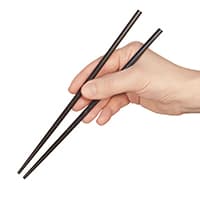 Eating slower has been linked to decreased calorie intake during meals. It allows you to realize you are full or satisfied sooner. Some techniques you can try to eliminate overeating by slowing down include setting your fork or spoon down between bites, eating with your opposite hand (eg. left had if you are right handed) or using chopsticks.
Eating slower has been linked to decreased calorie intake during meals. It allows you to realize you are full or satisfied sooner. Some techniques you can try to eliminate overeating by slowing down include setting your fork or spoon down between bites, eating with your opposite hand (eg. left had if you are right handed) or using chopsticks.
Focus on enjoying each bite instead of shoveling it in with the goal of clearing your plate.
23Find the Exercise Equivalent
Similar to how accurately tracking calories can be eye opening for many people, figuring out how much exercise it takes you to burn 100 calories can help curb temptation. Is that extra taco worth an extra hour on the treadmill? I love tacos, so it might be. Do you really want that late night bowl of ice cream if you know you'll need to cycle an extra 8 miles to burn it off?
Figuring out the exercise equivalent to your food choices allows you to think more rationally and less emotionally when it comes to a food craving.
24Eat with Other Healthy People
You're likely to eat similarly to the people you are with. Eat with family, friends or coworkers who eat the way you want to eat.
25Eat Fermented Foods
Fermented foods are extremely popular for their benefits to gut health but they have also been linked to decreases in body weight and body fat when tested in a study.
26Exercise More
 Exercise is fantastic for both the body and the mind. In a 2012 study, aerobic exercise was shown to reduce the neuronal response to food cues.
Exercise is fantastic for both the body and the mind. In a 2012 study, aerobic exercise was shown to reduce the neuronal response to food cues.
Don't forget, exercise also helps you burn calories. Regular exercise combined with not overeating is the best way to lose weight.
27Implement Portion Control
Split your food into portion sized servings that are ready to eat, so you don't accidentally eat too much. In a study, some college students were given a 400 calorie bag of crackers and the others were given four 100 calorie bags of crackers. The group with the 100 calorie portions ate 25.2% fewer calories.
28Increase Serotonin Levels
Serotonin is considered an appetite suppressant. Some ways to naturally increase your serotonin levels include exercise, exposure to bright light, as well as some supplements such as St. John's Wort, 5-HTP and B vitamins.
29Use Smaller Plates or Bowls
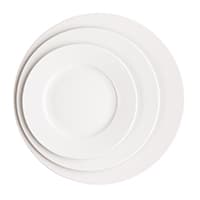 If you have a large plate, you are likely to fill it up with more food. Choosing a smaller one will lead you to put less on it. A study showed diners served 77% more pasta when given a large bowl compared to a medium sized one.
If you have a large plate, you are likely to fill it up with more food. Choosing a smaller one will lead you to put less on it. A study showed diners served 77% more pasta when given a large bowl compared to a medium sized one.
30Eat More Often
This piece of advice is pretty much the opposite of intermittent fasting, but planning regular small, healthy meals or snacks throughout the day can help you avoid overeating.
A study has shown that increased eating frequency has led to a decrease in perceived appetite. By eating regularly and knowing when your next scheduled snack is, you are less likely to overeat when meal time comes around.
Focus on low calorie snacks like raw vegetables or a protein shake.
31Chew Food Thoroughly
This is another tip essentially aimed at getting you to eat more slowly and hopefully realize when you are satisfied earlier. A study found that when people chewed each bite of pizza 40 times, "there was a reduction in hunger, preoccupation with food and a desire to eat."
32Eat More Fat
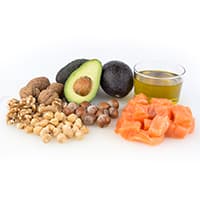 This one seemed to go both ways. One study showed that dietary fats can have a positive effect on satiety, while other studies showed that it can lead to overeating.
This one seemed to go both ways. One study showed that dietary fats can have a positive effect on satiety, while other studies showed that it can lead to overeating.
Fats are an absolutely necessary part of a healthy diet. Focus on consuming healthy fatty foods.
33Pop Peppermint Oil
Reduced appetite scores were seen in a study among the participants who consumed peppermint oil capsules vs placebo.
34Avoid Samples at Stores
I can tell you for a fact, that I consume at least 200 unplanned calories each time I visit Costco. Possibly a lot more. Sometimes I avoid this, while other times I enjoy the samples. Unfortunately the samples are usually closer to processed junk food (pizza, taquitos, fruit juices) that I don't need in my cupboard anyway and leave me still feeling hungry despite consuming additional calories.
35Increase Fiber Intake
Increased fiber intake has been associated with a lower body weight, with reportings of reduced appetite. Raw foods are often a great source of fiber and you can find more high fiber foods here.
36Drink Lemon Water
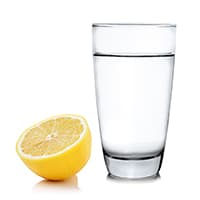 We've all heard that lemon water has a variety of health benefits, reduced appetite often reported among them. In trying to back up this customer favorite, I did find this study on Lemon Polyphenols reducing body weight gain, so perhaps there is something to it.
We've all heard that lemon water has a variety of health benefits, reduced appetite often reported among them. In trying to back up this customer favorite, I did find this study on Lemon Polyphenols reducing body weight gain, so perhaps there is something to it.
37Don't Buy Foods You Overeat
We all have those few foods that we lose all control around. I cannot eat a small portion of chips and salsa. The only way for me to avoid overeating this food is to keep it out of the house. If I don't buy chips, I don't overeat them.
38Consume Only What You Need
Molière has a quote that goes "One must eat to live, and not live to eat" and that is what this tip is getting at. Change your mindset to consider food a fuel for your body and not just a source of pleasure.
Eat high quality foods that provide adequate fuel (calories, proteins, fats, vitamins, minerals) for your body and don't eat to excess. More is not always better.
How in tune with your body are you really when it comes to feeling hungry? In order to figure out just how hungry you are, use this handy scale.
- Starving: This is when you’re uncomfortably hungry and maybe even a little light-headed. Your body’s blood sugar has taken a dive and you’re likely to binge eat. This can be dangerous territory, so don’t let yourself get this hungry.
- Hungry: You’re thinking about eating and you know if you don’t get something soon, you’ll enter the starve zone.
- Moderately Hungry: Your stomach is growling and you’ve got plans to eat soon. This is the best time to feed your body.
- Satisfied: You’ve eaten, but you could still have a few more bites (even though you probably shouldn’t).
- Full: Your belly is starting to feel the discomfort of overeating and the food doesn’t actually taste as good as it did the first few bites. This is a good sign to stop.
- Stuffed: You feel uncomfortable and like the food may come back up.
Hopefully there are a few ideas here that you can incorporate into your eating habits to help you stop overeating and maintain your desired healthy weight.
Have any of these tips worked for you?
Did any of these tips not work for you?
What do you do to prevent overeating?
